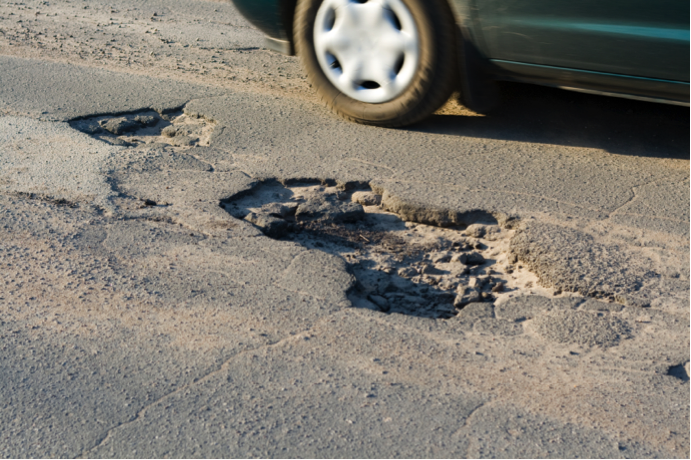 There are several rivalries that exist between Canadian cities, like the ongoing battle between diehard Toronto Maple Leafs fans and Montrealers devoted to their Habs. But there’s likely one thing that residents in every Canadian city, even these two, can attest to – and that’s a great disdain for potholes and terrible road conditions.
There are several rivalries that exist between Canadian cities, like the ongoing battle between diehard Toronto Maple Leafs fans and Montrealers devoted to their Habs. But there’s likely one thing that residents in every Canadian city, even these two, can attest to – and that’s a great disdain for potholes and terrible road conditions.
A pothole is created when water is absorbed into our porous roads. Once this water freezes in the winter and expands in the summer, a series of cracks are created in the pavement. The pothole is caused by the weight of cars driving over these cracks and pulling out chunks of road until they’ve finally become large cavities. Potholes prey on inexperienced drivers who’ve not yet learned how to expertly dodge them, and avoid a flat tire. Unfortunately, tires are not the only part of a vehicle that can be damaged by deteriorating road conditions. Anyone with auto mechanic training would advise you to have several parts of your vehicle assessed after a run-in with a pothole. Here are a few things the professionals would look out for:
Tire and Wheel Rim Damage
This is the most common type of damage that can occur after a run-in with a pothole. If you are fortunate enough to have gone over the hole at a very slow speed, you’ll probably be left with little to no damage. However, if you were driving at a faster pace you can be sure that you’ve likely hurt your tires. Tire damage can be as minor and easy to fix as a slow leak—which can be repaired for about $20 at an auto repair shop—or as major as a dented wheel rim or fully blown out tire. If your rim is dented beyond repair or your tire is completely flat, you’ll definitely have to replace them, and this can become quite expensive. Driving at a slow and steady pace is always a good idea, especially in an area that’s renowned for its potholes. This way you can see the trap coming and maneuver around it.
Price check: Each irreparable tire can cost you anywhere between $100 and $700 (or more) to replace, depending on the make and model of your car and tires. The cost of replacement wheel rims can range between $75 and $1500 (or more) per rim, depending on the size, make and material.
Suspension Damage
Recent graduates of auto mechanic colleges can confirm that a vehicle’s suspension system is a key component in ensuring a steady drive. The suspension system is designed to provide a smooth riding experience by absorbing any road bumps and vibrations. If damage occurs to the suspension system of a vehicle, the steering, stability and braking can also be affected—and you don’t need a diploma from an automotive mechanics school to understand the dangers that come with ineffective brakes. Here’s a list of signs that your car may have suspension damage:
- The vehicle is rolling or swaying when making turns
- The vehicle is bouncing or sliding sideways on rough roads
- The vehicle is sitting lower in the front or rear
- The vehicle is leaking or there are visible signs of physical damage (rust, dents etc.)
- There is a loss of steering control during sudden stops
Price check: Replacing you car’s suspension system can cost between $1000 and $5000 or more depending on the make, model and year of your vehicle.
Have the road conditions in your city ever caused damage to your vehicle?
